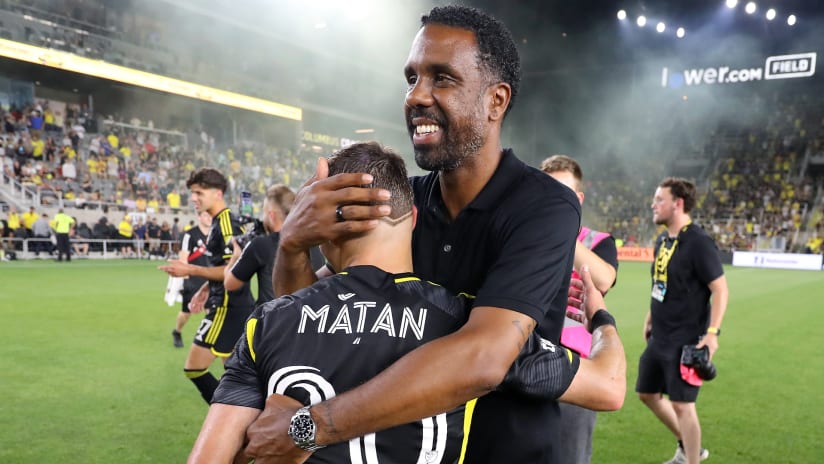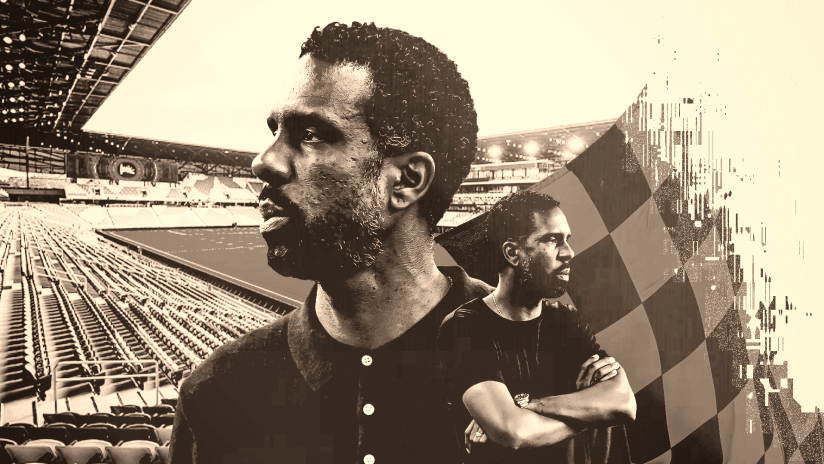A recent 4-2 road win over CF Montréal was no typical day at the office for Wilfried Nancy. How could it be?
He and three members of his Columbus Crew technical staff were leading the home team at Stade Saputo just a few months ago. After arriving in Quebec in 2005 with little more than a backpack in hand, Nancy lived there for the better part of two decades before taking the helm in Columbus last winter, most of it with CFM, where he slowly, methodically rose through the club’s ranks from academy to first team staff, and finally, head coach in the wake of Thierry Henry’s unexpected departure just before the start of the 2021 season.
“Wilfried was my provincial team coach when I was 14,” Montréal captain Samuel Piette told reporters afterwards. “It was weird to see him on the other bench.”
Many of the home supporters at Stade Saputo gave Nancy a warm welcome when he strode onto the field before kickoff. Perhaps there was a more profound tribute, however, in the boos they directed at their own team as CFM trudged back to the locker rooms 45 minutes later trailing 3-0, thanks to some textbook examples of Nancy's expansive, intelligent game model.
"It was strange,” agreed Nancy in regards to what he called an “emotional” return. “Because life is crazy in a way. Sometimes it can be cruel.”
Growth in Montréal
Nancy met his wife in Montréal and became a Canadian citizen there; it’s where they welcomed their two children into the world. He found his calling as a coach and developed his playing philosophy there. And even after leading CFM to the best season in their MLS history, he says he never lost sight of the fact his profession would, sooner or later, force him to leave.
“I'm really grateful about Montréal, because it's been a long time that I stayed over there,” Nancy told MLSsoccer.com in an extended sitdown earlier this year. “I knew that in my job, I'm going to have to move at one moment. So it was either going to be me or it was going to be the club that will fire me.”
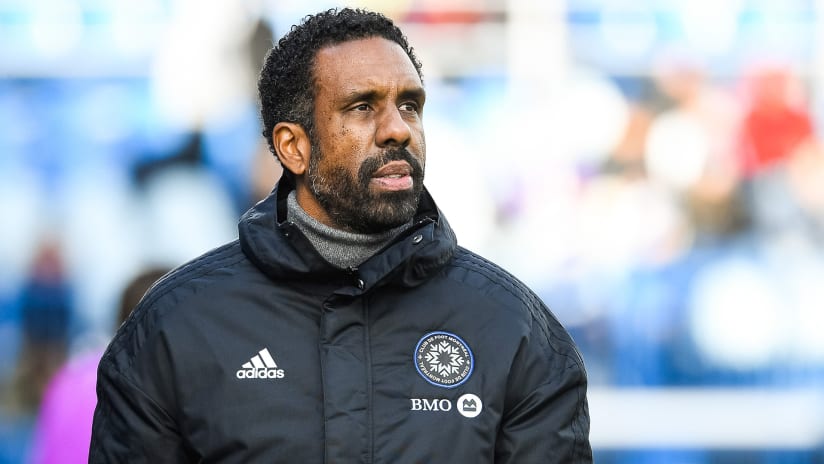
There the Frenchman’s face creased into a laugh, a chuckle that hinted at not only the hired-to-be-fired realities of his line of work, but the particular context of the club formerly known as l’Impact. The Quebecois side have had nine head coaches in their 12 campaigns since joining MLS in 2012, one of the league’s highest churn rates, what many would consider to be a manifestation of the Italian sensibilities of owner Joey Saputo.
There was no trace of bitterness from Nancy, just a sense of gratitude at the luxury of having options.
“Listen, Columbus approached me, and I had a good decision to make for my future,” he explained. “When I was younger, I traveled a lot. So I knew that in my job also, that I will travel in the future. I had this opportunity with Columbus, so my family, we discuss about this, and because this is something new for my family – not for me, because I have two kids and my wife, she knows, she's from Montréal, only Montréal.
“It was a possibility to discover something new in terms of culture, in terms of city, country, everything – and football also, because it's a new challenge. How can I convince new players to buy into what I want to do on the pitch? For me, this is powerful. So I said, why not?”
Like Henry, his former boss, Nancy can trace his father’s family heritage back to the Caribbean overseas department of Guadeloupe; his mother’s ancestry is Senegalese and Cape Verdean. Thanks to dad’s service in the French navy, the family traveled the globe when Wilfried was a child, taking him to distant ports of call like Martinique, Reunion and Djibouti before returning to Toulon, where his soccer career took flight.
That early exposure to humanity’s incredible diversity would come to inform his coaching ethos.
“Because of that, I am the person that I am now,” said Nancy. “I have a lot of respect for all the cultures, and also have a lot of empathy for the human being, I would say, because it was powerful for me to visit a lot of countries and to see something different. For me, I am able to understand people – not to accept everything, because I have no problem to say no, but to understand people: why they think like this, why they act like this, why they want to do some different decisions from me, do you understand what I mean?
“It's useful for my job, and for my life also.”
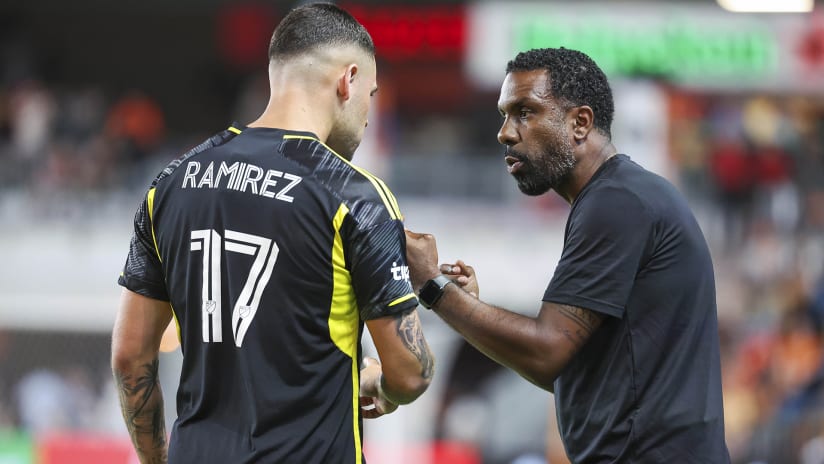
Concepts to reality
The Crew had reached the end of a cycle with Caleb Porter’s departure after four years in charge, a tenure marked by a 2020 MLS Cup triumph but failure to reach the Audi MLS Cup Playoffs in the other three. Ownership had twice broken the club’s inbound transfer record during that time, first to sign Lucas Zelarayán in late 2019 and again with the arrival of Cucho Hernández last year, along with the construction of glittering Lower.com Field and myriad other investments across the organization.
Nancy’s Montréal finished six slots and 19 points ahead of Columbus in the 2022 Eastern Conference standings, despite spending about $2 million less on their roster, according to MLS Players Association figures, and his team were both brave and entertaining in the process. This was the man Crew president and GM Tim Bezbatchenko wanted for the long run, even at the substantial cost of compensating CFM to hire away him and several of his colleagues.
“I am really happy to work for Columbus, because it's one club. The idea is to [implement] all these concepts from the youth academy until the first team,” said Nancy. “And I'm not talking about 4-3-3, 3-5-2, 3-4-3; this is not that. This is all about the ideas behind that, what concept we're going to use to manipulate the opposition, what concept we're going to use to try to win the ball back.
"So all this kind of things that have to be clear. And the more we do it with the young players, the more it’s going to be easier for us with the first team to do it, and we're gonna add more complexity. So this is the way.”
Showing both patience and opportunism to bait, disorganize and exploit the opponent. Switching the point of attack and maximizing width, pouring numbers forward – all three of Columbus’ goals in the run of play in Matchday 30 illustrated his core principles. A clinical demonstration of NancyBall, if you will, a proactive style that stands out in modern MLS, even as more and more famous names arrive to join its coaching ranks.
“For me what is the most important is the concept,” he declared to MLSsoccer.com, “and the concept, this is a way of life I cannot change. It’s going to be like that, because this is something that I believe.
“Do we need two passes because the opposition gives us the possibility to attack quick? Or do we need 25 passes to attack? It depends. So it's all about this connection between trying to attack most of the time, and when we don't have the ball, try to attack also to try to win the ball back as soon as possible. So we changed a bit of the way they were thinking.”
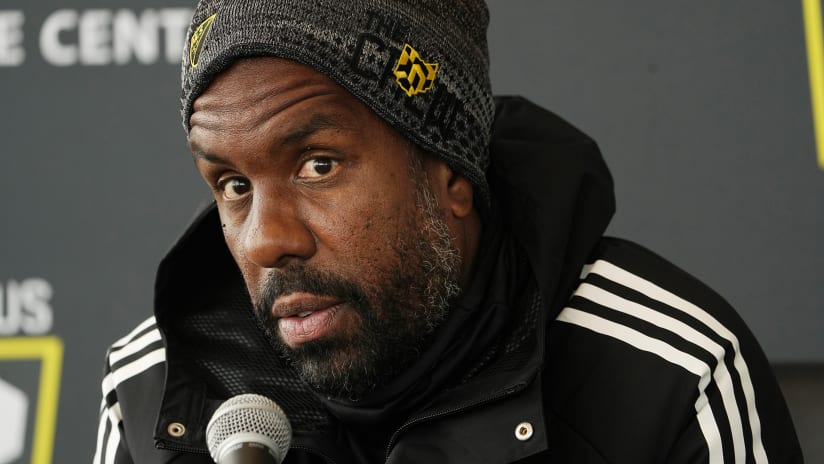
It is revealing that when asked to explain the origins of his game model, Nancy points first to his own limitations as a player.
“The fact that I never played in the first division in France, at around 23, 24 years old,” he recalled, “I knew that the future for me was to become a coach. So I had the time to set up everything, I had the time to think about everything.
“Everything is connected. Because when I was a player, I was not fast. I was playing center back, sweeper, and I was good technically and tactically. But I needed the other guys, my teammates, to play, to be good on the pitch,” Nancy continued.
“My idea was clear that in the future, when I'm going to be a coach, my team, we play. My team, we get this connection with the ball, because I did not like to run without the ball. It was a nightmare when I was doing it, you know?”
As he sees it, the modern game is simply too fast, too dynamic, and opponents are too painstakingly organized, to rely on individual skill or athleticism, or even patterns of play. Nancy and his staff painstakingly build a collective concept that both protects and liberates the individuals within.
“So this is a day-to-day work, this is a lot of video, this is a lot of interaction also, because I believe that to convince the player to do something – or to convince a human being to do something – he has to try things. He has to make mistakes,” he said. “He has to be comfortable in the uncomfortable situation. So this is something that we do all the time on the pitch: repetition, with clear situations, and also a structure, a defined structure. But within the structure, a lot of creativity within that.
“Because I believe that if we are able as a staff to give a good structure to the team, the players, they will understand if they need to dribble, if they need to pass the ball, if they need to take the ball, if they have to keep the ball – it depends. We are really, really, really, extremely demanding with the structure. But within the structure, the players have the freedom to pick and choose what is the good option.”
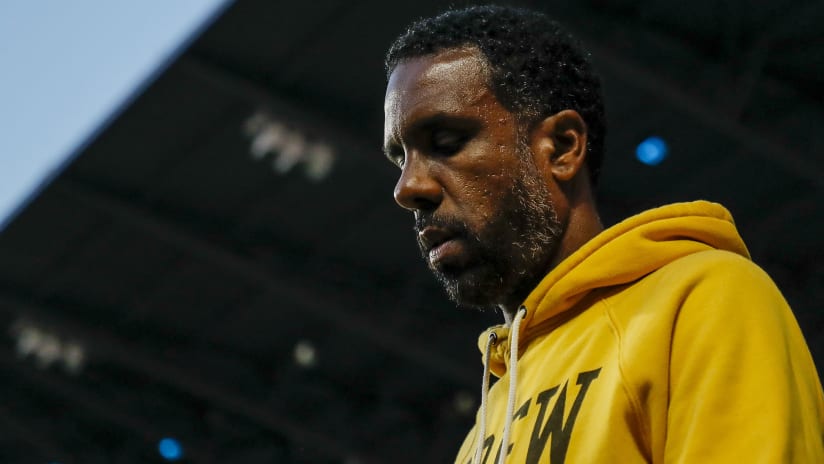
Challenging players
For many, that means unlearning fundamentals they’d internalized many years before, and unpacking what it means to take risks, and perhaps get punished.
“The coaching staff was very clear with me. They said, ‘You're going to have to forget how you were taught to play, to a certain degree,’” Canadian international Alistair Johnston, who has since moved on to Scottish giants Celtic, said last year of his experiences under Nancy.
“Because especially as a defender, you're instinctively taught, how fast can I move the ball forward? Whereas here, it’s like, how long can you wait, until a striker steps on your toe, before you pass the ball?”
Johnston became something of a poster child for the Nancy way. Acquired from Nashville SC in December 2021 for $1 million in allocation money, Montréal sold him to Celtic a year later for five times that after he starred for the CanMNT at the World Cup in Qatar. Even in the rondo drills where speed of thought and delivery is usually cherished, Nancy sought to reprogram the defender.
“Alistair, when he came – and it's normal, really good player – but all the time he was playing fast. One touch, two touch, and he was happy with that. And during the rondo, I say no, don't play one touch,” recalled Nancy. “Sometimes you have to play two touches or three touches, it depends. So he learns to slow down the play, to manipulate a little bit more the opposition to free up the space to go forward. Or maybe he's going to have more time for himself to play the pass, or is going to buy time for his teammate. So this is all these kinds of things that I like to challenge my players, because now the game is not one pace.
“You have to play with the rhythm. Because when you play with the rhythm, you are able to move the opposition east-west, or move the opposition now north-south, to play between the lines.”
In a landscape where most coaches are constantly seeking more speed, faster decisions, and fewer risks from their players, Nancy proudly and meticulously cuts against the grain.
“'Don't do this, don't do that. Don't do this. Don't do that,’” he said, characterizing what he heard from many of his peers over the years. “Don't stop the ball. Play quick. Center backs, you have to play two touches, all the time. Now, first touch away, don't stop the ball, or don't play back to the goalkeeper or don't play the ball back twice in a row, because it slows down the play, don't make lateral passes.
“But for me, everything, I put that in the bin. Because you have to use this tool to try to create time on the opposition. Because it's all about time. This is not about space – how can we have a time edge on the opposition, how can we have an advantage on the opposition?”
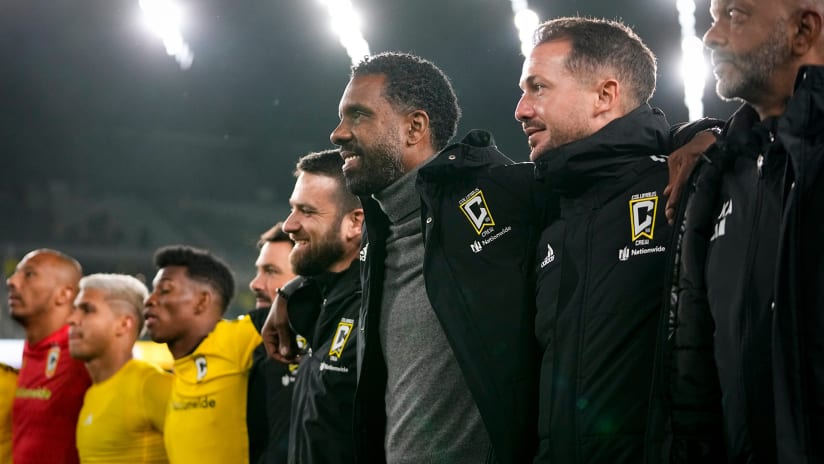
Columbus dreams
The Crew seem to have soaked up Nancy’s methodology even faster than CFM did. Currently sitting fifth in the East table, powered by a 10W-2L-4D record across all competitions since late May, the central Ohioans have garnered buzz as an MLS Cup 2023 dark horse. Beyond the productivity of established stars like Cucho, the growth shown by the likes of Aidan Morris, Christian Ramirez, Steven Moreira, Sean Zawadzki and Mo Farsi suggest Nancy and his staff are reaping gains across the roster.
“I didn't invent anything – this is football,” said Nancy. “Football is universal, like I like to say. My job is to try to find ways to simplify the game for my players, to let them understand quicker what they have to do, regarding the concepts that we put in place. This is my job. And my job also is to develop players to be better, and also to be a better person.
“Everybody talks about, you have to win, you have to win. Yes, I know that I have to win. If I don't win 10 games in a row, maybe I'm going to be out. But at the end of the day, I don't care about that, because this is our job. Me, I care about how we want to win, what we need to do, to maximize our chance to do a good game.”
Can Columbus mount a legitimate title push in a ferociously competitive Eastern Conference? Will Nancy build a legacy there like he did in Montréal? Have teams elsewhere – like, say, in his French homeland – taken note of his abilities like the Crew did?
All of these questions add further layers to the “story” Nancy wants to write on the pitch, wherever that voyage takes him.
“Yeah, I stayed in Montréal for a couple of years, but all my family lives all around the world,” he said. “This is something that I knew that I would have – I will live somewhere in the world, but I don't know where, and maybe in two or three or four years, five years, I'm going to go somewhere else. I don't know. I don't read in the future.
“I know that I want to enjoy my passion to be coach, and to enjoy this job and this passion. After that, my family supports me in a good way. So we’ll see in the future – maybe I'm going to stay 10 years in Columbus, or maybe it's going to be two years? I don't know. I don't know. What I know is, I want to live my passion.”
